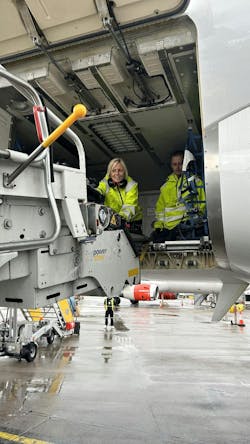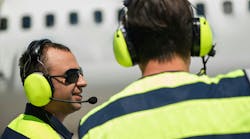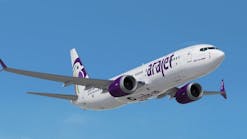Effective ground handling lies at the critical heart of the safety and efficiency of aircraft operations. Service delivery needs to be timely, professional and risk averse. That is why it is essential that those employed in the many complex processes that ground handling is composed of, from checks to refuelling, to cleaning and baggage handling need to be properly trained, primed and ready for the job.
Efficient ground handling is contingent upon the precision co-ordination of several processes to ensure quick turnaround in what is a heavily time sensitive environment. Indeed, the importance of good ground handling staff cannot be overstated. That is why it is crucial that trainers in the field have the right level of practical knowledge needed to prepare ground handlers for the demands that will be placed upon them.
To this end, trainers need to be ready not only to take their training into the field, but to experience things first hand for themselves. This is something that Johanna Gittne Jerrstedt, a Leadership Trainer from Swedish business education company Framfot is keen to acknowledge the value of: “For me as a trainer it's very valuable to understand the operational part of the business to be able to teach strategically. By visiting the company and participating in a walk-a-mile day, I am able to gain many new perspectives that I can then bring into the training room.”
The training team at Aviator Airport Alliance are also very much advocates of this hands-on approach. So much so, in fact, that recently they spent a day in the sorting area and ramp at Arlanda airport. During their day on the ground, they assisted staff in daily operations such as push-back, loading and unloading of baggage, delivery of baggage trolleys, stair operation and ramp supervision.
Lina Nilsson, Corporate Training Coordinator Passenger Services at Aviator, who participated on the day, is keenly aware of the many benefits this approach lends to their ground staff training. “Having our trainers experience the tasks that they are delivering courses on gives them a far greater understanding of the kinds of challenges that their students face day in and day out. We are training our students to be leaders in this very complex and sometimes stressful field, so it’s imperative that we feel some of that strain for ourselves.”
The benefits are not merely limited to the trainers developing a sense of empathy and greater bond with the students, however. It also allows trainers to further their knowledge of how ground operations are managed in the field, something that Nilsson is quick to acknowledge: “We need to be able to adapt our training to the real needs of our students, and that’s not possible if we have no experience of how things play out on a day-to-day basis. In this way, this was an invaluable information gathering exercise for us. ”
If the aviation industry is serious about increasing the ground handling talent pool, it needs to be serious about training. After all, a much-quoted study conducted by the Pew Research Center in the US found that 87% of all respondents said that they thought continuous training was central to their career development. To build the bonds that motivate the right kind of talent to not only join, but grow in the field, requires trainers to put themselves in their students' shoes, and in their workplaces.







